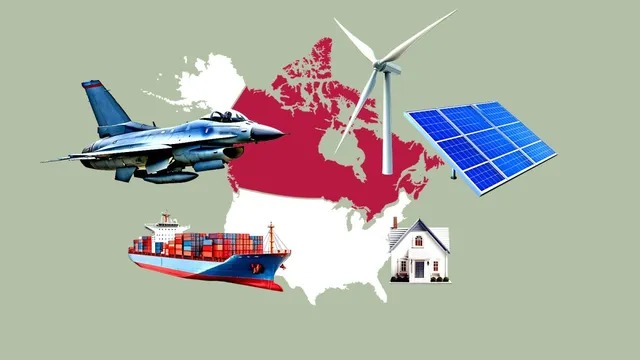
Mark Carney assumes prime minister role amid trade war with Trump
2025-03-14 15:59- Mark Carney, a former central banker, was sworn in as Canada's new prime minister on March 14, 2025.
- He replaces Justin Trudeau, who stepped down after significant pressure from within the Liberal Party.
- Carney's leadership is crucial as he confronts the trade war initiated by U.S. President Donald Trump and the potential for a snap federal election.
Express your sentiment!
Insights
On March 14, 2025, Mark Carney was sworn in as the new prime minister of Canada, replacing Justin Trudeau, who announced his resignation in January 2025 after facing mounting pressure within his party. Carney, a former central banker, steps into the role as Canada grapples with a series of challenges, including a trade war initiated by U.S. President Donald Trump who has threatened high tariffs on Canadian products and discussed the possibility of annexing Canada as the 51st state. Carney’s leadership comes during a critical time, as he is expected to call a federal election shortly after taking office after an arduous leadership race where he emerged victorious, distancing himself from the previous administration. In the role, Carney, at 59 years of age and with no prior political experience, is tasked with navigating the complexities of Canada’s trade relations with the United States, particularly in the face of Trump's aggressive economic policies which are causing unrest among Canadian citizens. His government is described as focused on action and bringing about a reset in relations with the U.S., indicating he is likely to take a confrontational approach with the Trump administration should respect for Canadian sovereignty not be established. Carney has publicly stated he is prepared to meet with Trump, yet only under conditions that reaffirm Canada’s independence. This sentiment reflects a growing Canadian nationalism that has sparked increased electoral support for the governing Liberal Party, previously poised for a significant electoral defeat. Carney has indicated intentions to reshape his cabinet to better tackle the ongoing economic struggles, with appointments intended to diversify trade partnerships and strengthen the country’s international relations amid a backdrop of internal dissatisfaction with U.S. policies. As the situation evolves, the Liberal Party now has a unique opportunity to capitalize on current sentiments against the Trump administration, utilizing Carney’s expertise as a former leader of both the Bank of Canada and the Bank of England. In terms of immediate challenges, Carney’s administration faces the prospect of a snap election, likely within weeks, as his government prepares to present itself as a new option amidst public and political fatigue with the previous administration. The opinion polls indicate a tight race ahead, primarily opposing the Conservative Party led by Pierre Poilievre, who Carney criticized as negative and not aligned with the needs of Canadians. The newly formed government, comprising a smaller cabinet team than its predecessor, seeks to quickly establish priorities and policies to navigate through the turbulent trading environment with the United States while assuring Canadian citizens of their political sovereignty and economic stability.
Contexts
Mark Carney, a prominent Canadian economist and central banker, has played a pivotal role in shaping the political and economic landscape of Canada during his career. As the Governor of the Bank of Canada from 2008 to 2013, Carney was instrumental in navigating the country through the global financial crisis. His policies emphasized fiscal stability and monetary prudence, which helped Canada emerge from the economic downturn more robustly than many other nations. Under his leadership, the Bank of Canada adopted a focus on inflation targeting and provided clear communication, which bolstered confidence among investors and consumers alike, reinforcing the central bank's credibility in times of uncertainty. Carney's approach to managing interest rates and financial policy marked a significant shift in Canadian monetary policy, and his tenure is often associated with a period of relative economic stability in Canada. After his successful term in Canada, Carney transitioned to the international stage as the Governor of the Bank of England, a role he held from 2013 to 2020. During his time in the UK, he dealt with the challenges posed by Brexit, implementing measures to ensure the stability of the British economy amid significant political upheaval. Carney advocated for bold actions to mitigate the economic impacts of these changes, emphasizing the importance of maintaining public confidence in financial institutions. His leadership style, characterized by a strong emphasis on transparency and accountability, continued to shape his approach to central banking, as he sought to address the complexities of global financial markets and the interconnectedness of economies worldwide. Throughout his career, Carney has been recognized for his ability to adapt to shifting political landscapes and respond to emerging economic challenges. His involvement in the global dialogue on climate change, particularly in finance, marks a notable chapter in his political history. Carney has been vocal about the financial risks posed by climate change, arguing that transition to a sustainable economy requires comprehensive changes in financial regulation and investment practices. He has championed initiatives such as the Task Force on Climate-related Financial Disclosures (TCFD), which aims to better inform investors about climate risks and promote responsible investment decisions. His vision reflects a growing recognition among policymakers and financial leaders that addressing climate risks is essential to ensuring long-term economic stability. Overall, Mark Carney's political history reflects a career marked by active engagement with crucial economic and environmental issues. His contributions to central banking, both in Canada and internationally, have established him as a leading figure in promoting sound economic policies during times of crisis. Carney's insights into the intersections of economic policy and climate change continue to influence the discourse on sustainable finance, making his work increasingly relevant in today's global economy. As he engages with both national and international audiences, his legacy within the realms of economic policy and political leadership will likely be felt for years to come.